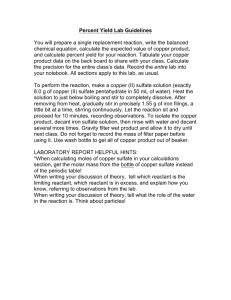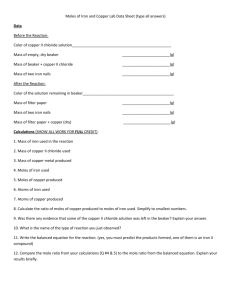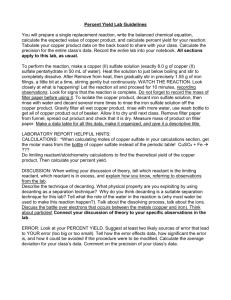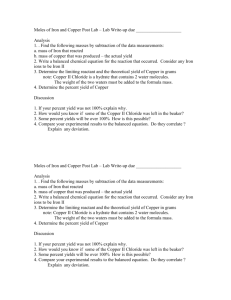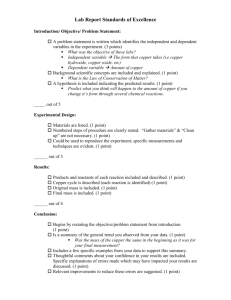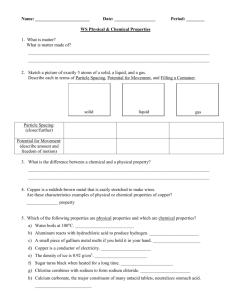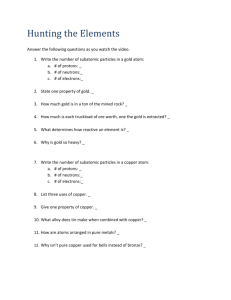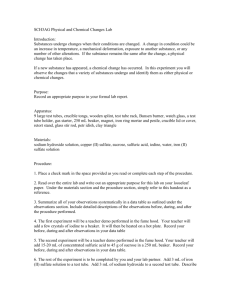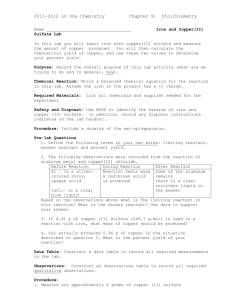Stoichiometry Lab: Single Replacement Reaction
advertisement
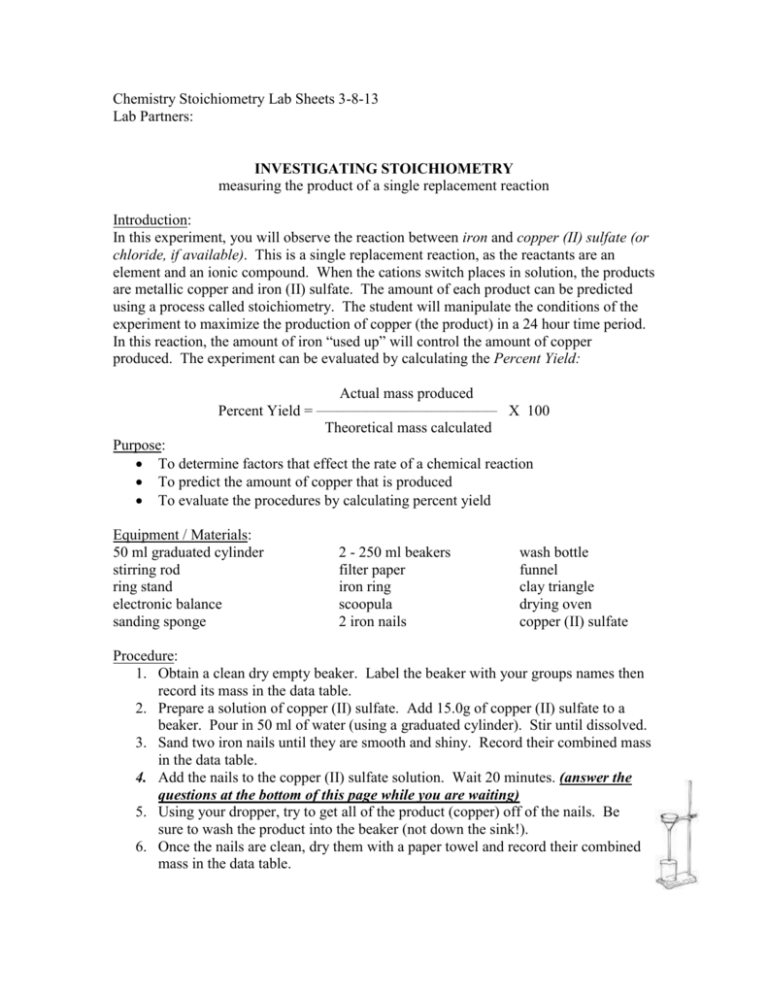
Chemistry Stoichiometry Lab Sheets 3-8-13 Lab Partners: INVESTIGATING STOICHIOMETRY measuring the product of a single replacement reaction Introduction: In this experiment, you will observe the reaction between iron and copper (II) sulfate (or chloride, if available). This is a single replacement reaction, as the reactants are an element and an ionic compound. When the cations switch places in solution, the products are metallic copper and iron (II) sulfate. The amount of each product can be predicted using a process called stoichiometry. The student will manipulate the conditions of the experiment to maximize the production of copper (the product) in a 24 hour time period. In this reaction, the amount of iron “used up” will control the amount of copper produced. The experiment can be evaluated by calculating the Percent Yield: Actual mass produced Percent Yield = ____________________________________ X 100 Theoretical mass calculated Purpose: To determine factors that effect the rate of a chemical reaction To predict the amount of copper that is produced To evaluate the procedures by calculating percent yield Equipment / Materials: 50 ml graduated cylinder stirring rod ring stand electronic balance sanding sponge 2 - 250 ml beakers filter paper iron ring scoopula 2 iron nails wash bottle funnel clay triangle drying oven copper (II) sulfate Procedure: 1. Obtain a clean dry empty beaker. Label the beaker with your groups names then record its mass in the data table. 2. Prepare a solution of copper (II) sulfate. Add 15.0g of copper (II) sulfate to a beaker. Pour in 50 ml of water (using a graduated cylinder). Stir until dissolved. 3. Sand two iron nails until they are smooth and shiny. Record their combined mass in the data table. 4. Add the nails to the copper (II) sulfate solution. Wait 20 minutes. (answer the questions at the bottom of this page while you are waiting) 5. Using your dropper, try to get all of the product (copper) off of the nails. Be sure to wash the product into the beaker (not down the sink!). 6. Once the nails are clean, dry them with a paper towel and record their combined mass in the data table. 7. Light your Bunsen burner and use it to evaporate off all the water in the beaker…..be careful not to heat it too fast or too hot it will spatter!! 8. Weigh the beaker and copper and record below. 9. Use the brushes at the front of the room to clean your beaker out and return it to the cart clean and dry. Data: ITEM MASS (g) Clean empty beaker (with name) ____________________ Dry beaker with product ____________________ 2 nails before reaction ____________________ 2 nails after reaction ____________________ Calculations: 1. Write a balanced equation for this experiment: 2. How many grams of iron were actually used up in the reaction? 3. How many grams of copper were (actually) produced in the reaction? 4. What was the limiting reactant in this reaction? How did you know? 5. Calculate (using stoichiometry) the theoretical number of grams of copper that should have been produced, given the amount of iron used in #2. 6. Calculate your percent yield for the production of copper. Additional Calculations: 7. How many atoms of copper were produced in this experiment? 8. Calculate the number of grams of iron (II) sulfate produced in this experiment based upon the lost iron from the nails. Evaluating Your Procedures: Record the % yield of copper produced by each lab group below. - Group 1 - Group 2 - Group 3 - Group 4 - Group 5 - Group 6 - Group 7 - Group 8 - Group 9 Write a conclusion paragraph for this experiment. o Be sure to evaluate the procedures developed by your group and explain any differences in mass among the groups. o Explain any values greater or less than 100 % yield – what might cause a higher than100 % yield? Lower %? How could you verify your hypothesized reasons? 9. Prepare a formal lab report for this lab and submit it to Moodle when you have finished. Each member of your lab group must submit THEIR OWN lab report!! Brainstorming: Answer the following questions while you wait for this reaction to take place What is your groups focusing question for this reaction? What is your groups hypothesis? What could be a control group for this experiment? What are your dependent and independent variables? What variables will you need to hold constant in this experiment? Explain the difference between the limiting and excess reactant in a reaction. What color is the copper II sulfate solution? Explain why it is this color. Suppose the color of the solution changes to grey/clear after 20 minutes…..what would this mean in terms of the limiting reactant…..copper or iron? Explain Suppose the nail disappears completely and the solution stays blue….what would this mean in terms of the limiting reactant….copper or iron? Explain Give at least 2 factors that might affect the amount of copper produced. How do you suppose we will measure the amount of copper produced in this reaction? What color is the substance that is forming on the outside of the nail? Explain You have weighed the nails……calculate the theoretical yield of copper that can be produced from these nails. How will you determine the actual yield of copper in this reaction? How will you determine the % yield in this reaction?
